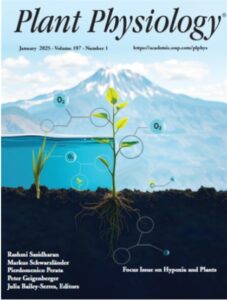Plant Physiology Webinar: Hypoxia and Plants
Celebrating the January 2025 Focus Issue on Hypoxia and Plants
Recorded Tuesday, January 28, 2025
About This Webinar
 The January 2025 Focus Issue of Plant Physiology, edited by Rashmi Sasidharan, Markus Schwarzländer, Pierdomenico Perata, Peter Geigenberger and Julia Bailey-Serres, spotlights research on hypoxia in plants. Oxygen is essential for efficient aerobic energy generation in plant cells. However, plant cells and tissues are often subject to fluctuations in oxygen levels. An imbalance between demand and availability can lead to cellular hypoxia. Hypoxia has been associated with environmental conditions like flooding, but also ice encasement, microgravity, high elevations, and microbial interactions.
The January 2025 Focus Issue of Plant Physiology, edited by Rashmi Sasidharan, Markus Schwarzländer, Pierdomenico Perata, Peter Geigenberger and Julia Bailey-Serres, spotlights research on hypoxia in plants. Oxygen is essential for efficient aerobic energy generation in plant cells. However, plant cells and tissues are often subject to fluctuations in oxygen levels. An imbalance between demand and availability can lead to cellular hypoxia. Hypoxia has been associated with environmental conditions like flooding, but also ice encasement, microgravity, high elevations, and microbial interactions.
This webinar features speakers Bart Nicolaï, Amanda Cardoso, Motoyuki Ashikari, and Beatrice Giuntoli, who share findings from their work appearing in this Focus Issue. The webinar is hosted by Plant Physiology editor Rashmi Sasidharan and is moderated by Plant Physiology Assistant Features Editor Alicja Kunkowska.
SPEAKERS
 Bart Nicolaï: Hypoxia in tomato fruit during ripening: a developmental cue for pore morphogenesis?
Bart Nicolaï: Hypoxia in tomato fruit during ripening: a developmental cue for pore morphogenesis?
Bart Nicolaï is a professor at the Biosystems Department at the University of Leuven in Belgium. After earning master’s degrees in agricultural engineering and applied mathematics at the at the universities of Ghent and Leuven he completed his PhD in applied biological sciences in 1994 at the latter university. He is head of the postharvest group and managing director of the Flanders Centre of Postharvest Technology, a public-private partnership which was established in 1997 by the University of Leuven and the Association of Belgian Horticultural co-operatives. Bart’s research area is postharvest biology and technology of fruit and vegetables, with a focus on physiological responses of fruit when stored under hypoxic conditions. His lab also develops techniques for nondestructively measuring quality attributes of fruit and vegetables. See https://doi.org/10.1093/plphys/kiae174.
 Amanda Cardoso: Plant hydraulic impairments in response to waterlogging
Amanda Cardoso: Plant hydraulic impairments in response to waterlogging
Amanda Cardoso is an assistant professor of crop physiology at North Carolina State University. Her studies focus on identifying climate-resilient crops, uncovering structural and functional resilience mechanisms, and generating knowledge on best management practices for plant production under challenging climates. She recently published an article (https://doi.org/10.1093/plphys/kiae336) where she used Phaseolus vulgaris as a model species to demonstrate that plant impairments in response to waterlogging are intrinsically linked to water transport limitations.
 Motoyuki Ashikari: Surviving floods: Escape and quiescence strategies of rice to cope with submergence
Motoyuki Ashikari: Surviving floods: Escape and quiescence strategies of rice to cope with submergence
Motoyuki Ashikari is a professor at the BioScience & Biotechnology Center, Nagoya University. His lab is researching various useful agricultural traits in rice, such as growth, yield, and environmental stress resistance, from the genetic level to the field level. His lab group has identified several genes and genetic pathways that are involved in rice growth and yield as well as responses to flooding. The lab also explores genetic diversity in wild rice relatives and has identified genes that have been altered during domestication. His research is also contributing to breeding projects to improve rice in Asia and Africa. https://doi.org/10.1093/plphys/kiaf029
 Beatrice Giuntoli: Synthetic biology strategies to explore and expand plant responses to hypoxia
Beatrice Giuntoli: Synthetic biology strategies to explore and expand plant responses to hypoxia
Beatrice Giuntoli is Associate Professor of Plant Physiology in the Biology Department of the University of Pisa, where she also earned her PhD in Molecular Biotechnologies. She has investigated ever since the physiological consequences of hypoxia and oxygen fluctuation in plants. Together with teams from Pisa (Sant’Anna School of Advanced Studies), Oxford (Biology Department and Nuffield Department of Medicine) and Aachen (RWTH), she has contributed to the discovery of a mechanism for direct oxygen sensing mechanism based on cysteine oxidase enzymes, active in both plants and metazoans. Her research is focussed on the design of genetically encoded biosensors in plants, the reconstruction of synthetic oxygen-regulated mechanisms in eukaryotes and the development of optogenetic tools for plants and bacteria. See https://academic.oup.com/plphys/advance-article/doi/10.1093/plphys/kiae623/7914984.
HOST
 Rashmi Sasidharan, Plant Physiology Monitoring Editor
Rashmi Sasidharan, Plant Physiology Monitoring Editor
Rashmi Sasidharan is a professor of plant stress resilience at Utrecht University who studies how plants sense, respond and acclimate to flooding. She combines genomics, genetics and molecular physiology to probe the roles of the associated stress signals (hypoxia, ethylene, starvation, ROS), the responses they elicit and the functional relevance for plant survival both during flooding. She uses the model plant Arabidopsis and flood-adapted ‘non-model’ wetland species to identify where in this signal-to-response network, variation (inter or intra-species) arises between sensitive and tolerant plants. Rashmi is also interested in identifying the signaling networks facilitating flooding recovery upon reoxygenation and exploring the parallels with drought.
MODERATOR
 Alicja B. Kunkowska, Plant Physiology Assistant Features Editor
Alicja B. Kunkowska, Plant Physiology Assistant Features Editor
Alicja is a Postdoctoral Researcher in Prof. Pierdomenico Perata lab at Sant’Anna School of Advanced Studies in Pisa, Italy. Her research focuses on deciphering the molecular mechanisms integrating hypoxia signaling with sugar availability, using Arabidopsis thaliana as a model organism. Alicja is interested in the fine-tuning of ERF-VII transcriptional activity by post-translational modifications.

